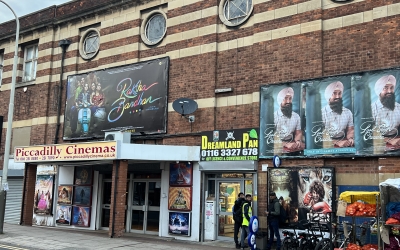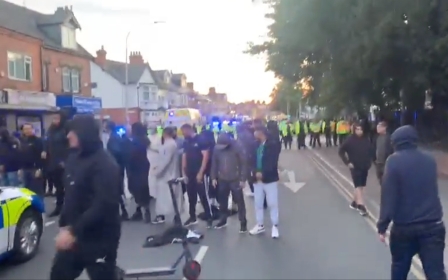Concerns over Leicester unrest reviewer’s Henry Jackson Society links

A former Labour MP leading a review into last year’s unrest in the British city of Leicester has ties to a controversial think tank that downplayed the role of right-wing Hindutva activists in stoking community tensions.
Ian Austin, who now sits in the House of Lords as an independent peer, was appointed last week by communities secretary Michael Gove to conduct an independent review into last September’s violence in which Hindu and Muslim youths confronted each other on the streets of the city in the English Midlands.
But Muslim groups and activists in the city have raised concerns about Austin’s appointment over his connections to the Henry Jackson Society, which said in a report into the unrest last year that it had found no evidence of a role played by Hindu ultra-nationalist groups.
The report accused some members of the Muslim community of spreading a “false narrative” about the involvement of supporters of the Hindu nationalist movement.
Austin has hosted and spoken at a number of Henry Jackson Society events in parliament and has praised the neoconservative think tank’s “important and valuable work”.
New MEE newsletter: Jerusalem Dispatch
Sign up to get the latest insights and analysis on Israel-Palestine, alongside Turkey Unpacked and other MEE newsletters
But the think tank has been criticised by Muslim organisations including the Muslim Council of Britain, which accused it in 2017 of having “served to demonise British Muslim communities”.
Community activists in Leicester spoken to by Middle East Eye warned that Austin's appointment would do more harm than good for community relations.
'The government’s decision to appoint Ian Austin will create more problems than good - especially his close working relationship with HJS and their propagation of anti-Muslim tropes is deeply problematic'
- Sharmen Rahman, councillor
Groups who have condemned Austin include councillors from Leicester’s Hindu and Muslim communities, who sent a letter to British Prime Minister Rishi Sunak saying that his appointment “raises serious concerns about the review’s integrity and objectivity”.
"The choice of Lord Ian Austin as its chair, on the other hand, raises serious concerns about the review's integrity and objectivity," said the councillors' letter to Sunak.
Leicester's Federation of Muslim Organisations (FMO) also wrote to Sunak to condemn the appointment, warning that it would lead to a review that would have “no credence before it even concludes its findings”.
"While we welcome a fair and impartial inquiry to better understand the issues and to eradicate hate and division for all communities in our city and beyond," the FMO said in a statement.
"We do not believe this can be achieved without the support or full confidence of our community. As it stands, we cannot, indeed, we will not support or contribute to an ‘inquiry without integrity’ from the outset."
Sharmen Rahman, who served as a Labour councillor in the area where the unrest took place, said Austin’s appointment would create more problems than solutions for Leicester.
“One of our repeated requests was that the person leading the review was non-political and from a legal background so we could focus on facts and not push a political agenda so that it was fair to all parties - like a retired judge or a specialist in this field,” Rahman told Middle East Eye.
“The government’s decision to appoint Ian Austin will create more problems than good - especially his close working relationship with HJS and their propagation of anti-Muslim tropes is deeply problematic."
“Both Austin and the Henry Jackson Society have a clear track record of demonising Muslims and perceiving Muslims as the problem, which means that the significant Muslim population which was affected by the violence will not trust his review and would not ascribe to the recommendations given by it.”
The Muslim Council of Britain also condemned the government's decision to appoint Austin to lead the independent review into the Leicester riots.
"It is crucial to have an independent reviewer who is impartial, fair, and capable of gaining the trust of all stakeholders," the MCB said in a statement.
Following last September’s riots in Leicester, local police arrested nearly 100 people in connection with the unrest.
Nearly 200 Hindu youths marched through Leicester’s Highfield area, leading to confrontations with the city's Muslim community, chanting "Jai-Shri-Ram", a chant appropriated by Hindu nationalists in India and frequently used to intimidate the country’s minority Muslim population.
Claims of bias
Earlier this month, UK security sources told the Mail on Sunday that Indian political activists linked to Indian Prime Minister Narendra Modi are suspected of inciting British Hindus to confront Muslim youth in Leicester.
Modi is reported to have been a member of the RSS, a Hindu nationalist paramilitary group driven by Hindutva ideology, which seeks to establish a Hindu Rashtra, a nation rooted in Hindu principles and values.
This vision involves marginalizing minority communities such as Christians, Dalits, and Muslims, with the aim of creating a purely Hindu Indian nation.
Leicester Mayor Peter Soulby also commissioned a review into the unrest in September 2022 that was due to be led by Chris Allen, an academic at the University of Leicester’s Centre for Hate Studies.
But Allen stepped down following an outcry from the city's Hindu community over his appointment, which they described as “biased against the Hindu community”, and comments he had made that appeared to rule out the role of “Islamist extremism” in fuelling the unrest.
In announcing the review, Gove said he had commissioned it to "understand the origins of the unrest and explore how similar events can be prevented in the future”.
He said the review panel, whose other members have yet to be announced, would provide an "analysis of the causes of the unrest" and "set out proposals and ideas for strengthening social cohesion locally”.
"Communities living and working together have formed some of the most vibrant societies across the country and cities such as Leicester have proud histories of tolerance and diversity," Austin said in a government press statement.
"This makes the scenes we witnessed in Leicester last year all the more worrying and it is therefore so important that we listen to people in Leicester to get to the bottom of what happened and why."
A spokesperson for the Department of Leveling Up, Housing, and Communities told MEE that it planned to release further details of the review.
"We are confident that this thorough, independent review will strengthen community cohesion in Leicester - a city with a proud history of tolerance and diversity," the spokesperson said.
“The independent panel of experts will hear from a wide range of people and voices from across the city and beyond, to get to the bottom of what happened and why."
In 2012, Austin was forced to apologise to Leicester-based group, Friends of Al Aqsa, for claiming that the Palestinian rights group had denied the Holocaust had taken place.
But Austin is not the first person appointed to lead an independent review to face scrutiny over their connections to the Henry Jackson Society.
In 2021, William Shawcross’s appointment as a reviewer of the UK government’s Prevent counter-terrorism strategy was widely criticised over past remarks he made as chair of the think tank in which he said “Europe and Islam is one of the greatest, most terrifying problems of our future.”
Leicester City Council and Ian Austin had not responded to requests for comment at the time of writing.
Middle East Eye delivers independent and unrivalled coverage and analysis of the Middle East, North Africa and beyond. To learn more about republishing this content and the associated fees, please fill out this form. More about MEE can be found here.





